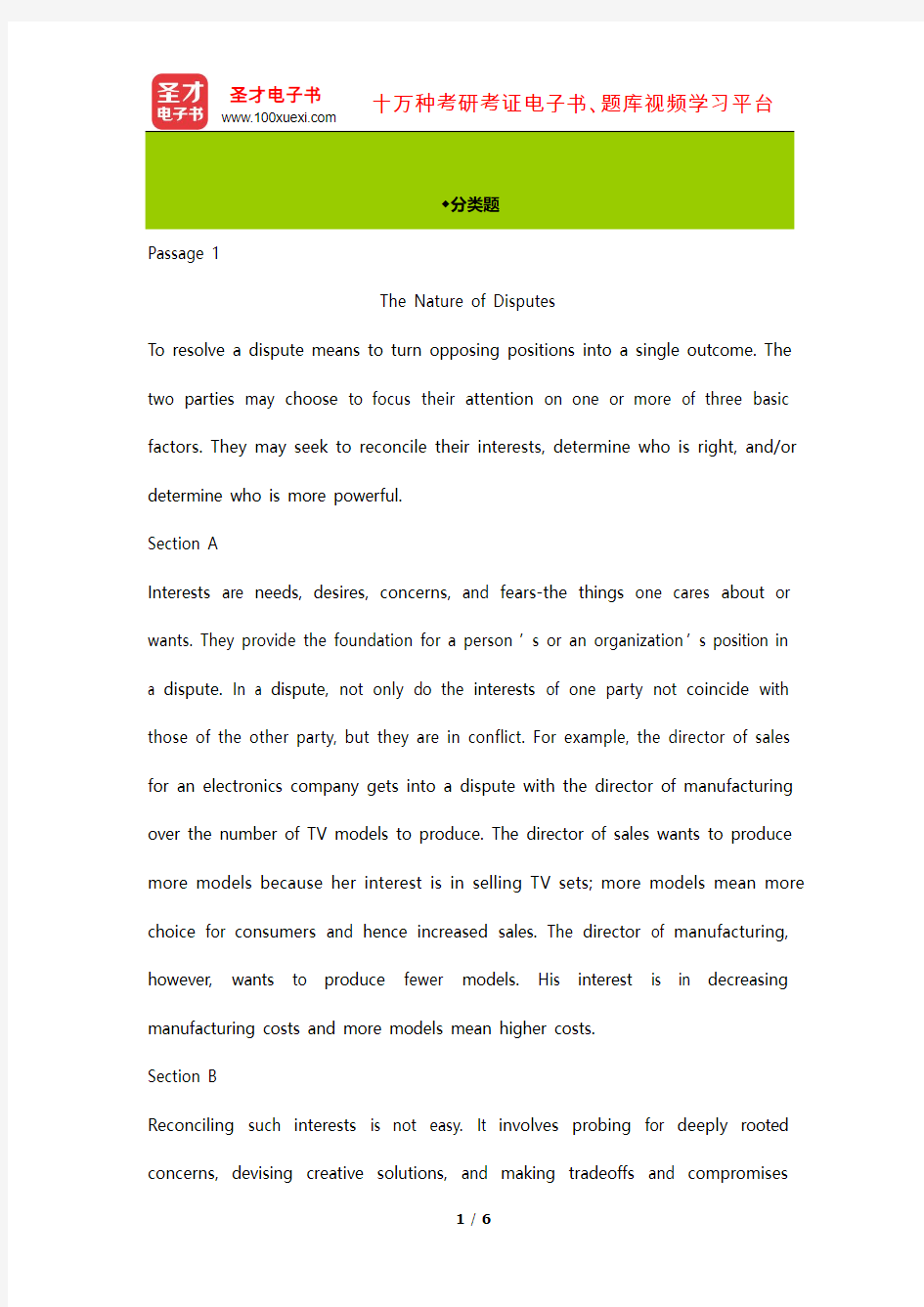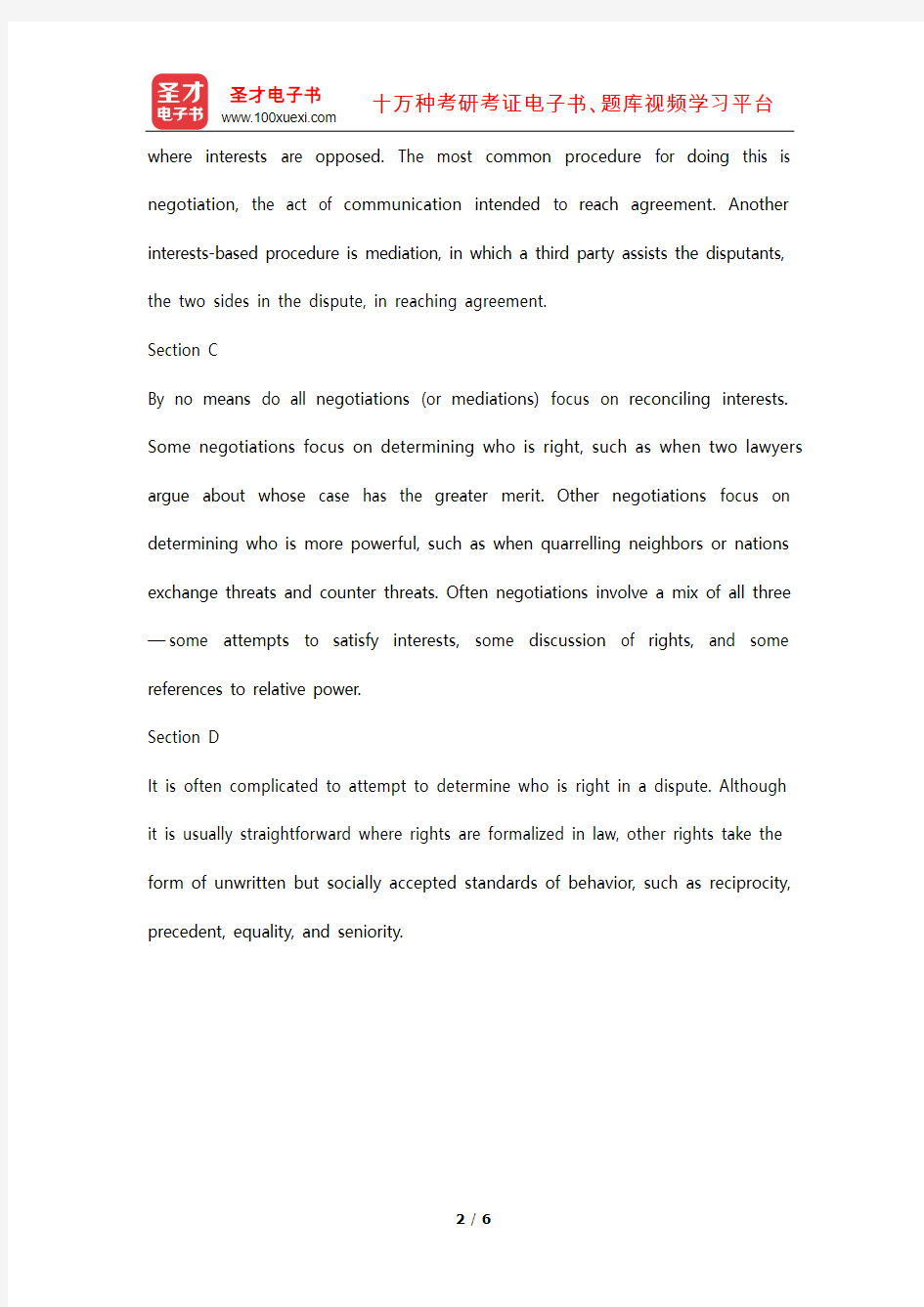

◆分类题
Passage 1
The Nature of Disputes
To resolve a dispute means to turn opposing positions into a single outcome. The two parties may choose to focus their attention on one or more of three basic factors. They may seek to reconcile their interests, determine who is right, and/or determine who is more powerful.
Section A
Interests are needs, desires, concerns, and fears-the things one cares about or wants. They provide the foundation for a person’s or an organization’s position in a dispute. In a dispute, not only do the interests of one party not coincide with those of the other party, but they are in conflict. For example, the director of sales for an electronics company gets into a dispute with the director of manufacturing over the number of TV models to produce. The director of sales wants to produce more models because her interest is in selling TV sets; more models mean more choice for consumers and hence increased sales. The director of manufacturing, however, wants to produce fewer models. His interest is in decreasing manufacturing costs and more models mean higher costs.
Section B
Reconciling such interests is not easy. It involves probing for deeply rooted concerns, devising creative solutions, and making tradeoffs and compromises
where interests are opposed. The most common procedure for doing this is negotiation, the act of communication intended to reach agreement. Another interests-based procedure is mediation, in which a third party assists the disputants, the two sides in the dispute, in reaching agreement.
Section C
By no means do all negotiations (or mediations) focus on reconciling interests. Some negotiations focus on determining who is right, such as when two lawyers argue about whose case has the greater merit. Other negotiations focus on determining who is more powerful, such as when quarrelling neighbors or nations exchange threats and counter threats. Often negotiations involve a mix of all three —some attempts to satisfy interests, some discussion of rights, and some references to relative power.
Section D
It is often complicated to attempt to determine who is right in a dispute. Although it is usually straightforward where rights are formalized in law, other rights take the form of unwritten but socially accepted standards of behavior, such as reciprocity, precedent, equality, and seniority.
There are often different-and sometimes contradictory-standards that apply to rights. Reaching agreement on rights, where the outcome will determine who gets what, can often be so difficult that the parties frequently turn to a third party to determine who is right. The most typical rights procedure is adjudication, in which disputants present evidence and arguments to a neutral third party who has the power to make a decision that must be followed by both disputants. (In mediation, by contrast, the third party does not have the power to decide the dispute.) Public adjudication is provided by courts and administrative agencies. Private adjudication is provided by arbitrators.
Section E
A third way to resolve a dispute is on the basis of power. We define power, somewhat narrowly, as the ability to pressure someone to do something he would not otherwise do. Exercising power typically means imposing costs on the other side or threatening to do so. The exercise of power takes two common forms: acts of aggression, such as physical attack, and withholding the benefits that derive
from a relationship, as when employees stop working in a strike.
Section F
In relationships of mutual dependence, such as between labor and management or within an organization or a family, the question of who is more powerful turns on who is less dependent on the other. If a company needs the employees’work more than employees need the company’s pay, the company is more dependent and hence less powerful. How dependent one is rums on how satisfactory the alternatives are for satisfying one’s interests. The better the alternative, the less dependent one is. If it is easier for the company to replace striking employees than it is for striking employees to find new jobs, the company is less dependent and thereby more powerful. Determining who is the more powerful party without a decisive and potentially destructive power contest is difficult because power is ultimately a matter of perceptions.
Classify the following disputes as relating to
A. reconciliation of interests
B. determination of rights
C. determination of who is more powerful
Write the correct letter, A, B or C in boxes 1-6 on your answer sheet.
1. A mother disapproves of her son’s fiancee and threatens to disown her son if he marries her. The marriage goes ahead, but after some years the mother accepts it
because she wants to reestablish a good relationship with her son.
2. A large company decides to buy a new computer system. The accounting department wants System X. The marketing department insists on System Y. A settlement is reached after a series of meetings between the disputants.
3. Island C is claimed by both Country A and Country B. The decision to determine whose land it is given to the United Nations, which concludes that Country A may have Island C because of stronger social and historical ties.
4. A married couple can afford only one car. The wife wants a simple, transportation vehicle. The husband wants a sports car to impress his friends. A mutual friend helps them reach the agreement.
5. A divorcing couple disagreeing about who will get custody of their children .go to a court of law. The court determines the mother should have custody.
6. An employer refuses to pay an employee because of poor job performance. The employee promises to improve his work.
【答案与解析】
1.C 这道题不仅要能理解题干中的三种类别,也要理解每个问题的意思。该题中母亲起初
反对这场婚姻,可是多年后却为了和儿子建立好的关系不得不接受了。这种变化表明母亲和儿子之间的权力或者力量对比发生了变化,母亲要更依赖于儿子。因此,这道题涉及的是决定谁更有权力。故选择C。
2.A 这个例子涉及的是同一个企业内部不同部门之间就同一件事情发生了争执,最后通过
协调达成共识。这两个部门的出发点都是企业的共同利益,因此这属于谈判以达到利
益的一致,这属于调解。故选择A。
3.B 这个例子中联合国将土地判给A国的原因是A与土地有较强社会和历史联系,这属于
仲裁,因此应该选择B。
4.A 这个例子最终结果是达成了一致,属于调解,所以应选择A。
5.B 这个例子中法院最后将孩子抚养权判给母亲,这属于是法院仲裁,所以选B。
6.C 这个例子体现了明显的实力对比的关系。雇员要更依赖于雇主,所以承诺改进工作。
因此这属于决定谁更有权力。所以选择C。